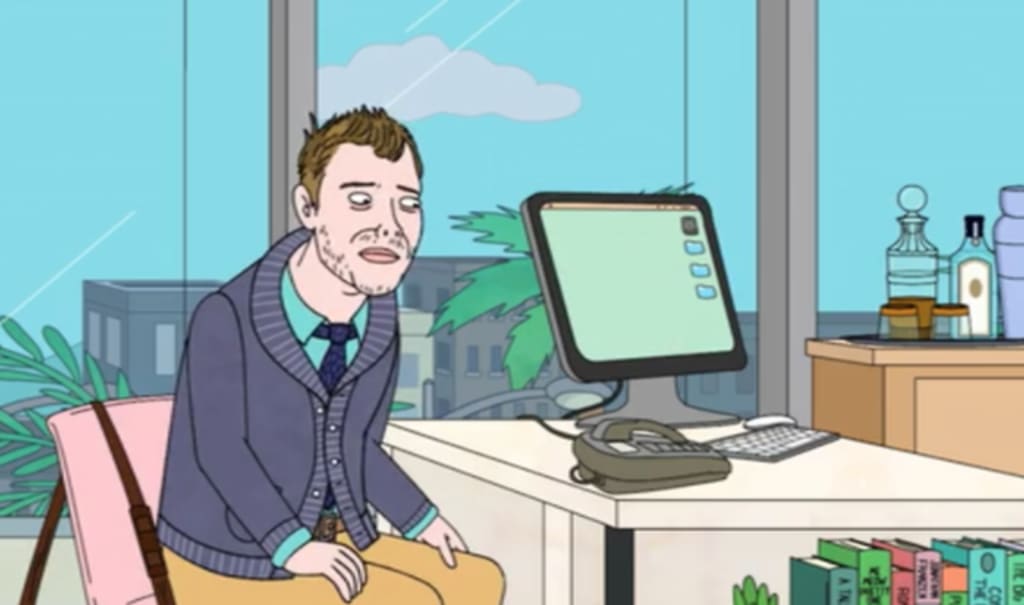On Flip McVicker
The cautionary flipside to BoJack Horseman's message

Over the course of 2020, I have rewatched the entirety of Netflix Original Series BoJack Horseman at least twice. “Why?” my friends ask. “Research,” I say, not researching a thing. To be honest, I just like passing the time. However, in rewatching Season 5 of BoJack Horseman, I’ve come to realize what a fascinating character Flip McVicker is. Flip, voiced by escaped clone of Freddie Mercury Rami Malik, is the eccentric, low-energy, high-maintenance lead writer of Philbert, the show within the show that titular character BoJack Horseman stars in as titular character within titular character Philbert. Season 5 marked a violent shift in the show’s timbre, between BoJack’s newfound addiction to painkillers, Princess Caroline’s eternal quest to balance producing a show and adopting a baby, and Diane’s divorce from Mr. Peanutbutter. Setting the stage? Flip McVicker.
Before I dive in, I don’t mean to heap praise on the character. Flip is a faux-intellectual and a bit of a chauvinist, as evidenced by his writing of character Sassy Malone (“loves cold rooms and hates bras”) and his treatment of Diane, actively not letting her co-write. However, that reading of Flip leaves out the fact that he is kind of a Hollywood meat grinder. As evidenced by co-star Gina Cazador’s backstory, having been in 27 other similar pilot series, Philbert is not a unique show. The gritty atmosphere and the dead wife trope also signal that for the viewer. It’s one of many psychological detective dramas bent on raising questions and relishing in the fact that there are very few answers. The fact that Flip rejects Diane’s assistance on the script is as much an artist’s ego problem as it is a white male ego problem. He claims to have a strict and pure artistic vision, but in that, his vision is visionless.
This brings me to my next point. Philbert is a success, in part because of Diane’s intervention and in part because it aptly reflects the plot of BoJack Horseman and, by that nature, it reflects the life of BoJack Horseman the character. It portrays a tortured soul living out his life, but the writing excuses the bad things that the character has inflicted upon other people. As Diane makes clear, the show is a success for the wrong reasons. Rather than deconstructing the figure of the flawed man with a dark past, it excuses the flawed man’s dark past. This is almost the opposite of the point that BoJack Horseman the show is trying to make, and in that, Philbert represents BoJack Horseman the show and Flip McVicker represents BoJack Horseman with the wrong creative team. When BoJack finds solace in the fact that audiences enjoy the character of Philbert, the show goes out of its way to portray this as a negative character arc. With Philbert, the team behind BoJack Horseman takes essentially a season-long detour to rectify that the show doesn't aim to glorify BoJack's archetype in any way.
Flip McVicker is reminiscent of an artist with a strong vision but no direction, and as a writer, I’ve been through this before. In workshops, I’ve answered, “Because it is,” or, “That’s the point,” in response to when people ask what the point of anything I’ve written is. I like to think I’ve evolved past that, but Flip McVicker’s arc also raises questions of the intended message of art versus the actual acquired meaning of it. Flip’s purposes for writing Philbert are sketchy: he wants to portray a complicated, dark, twisted man in a dark, twisted reality, but he doesn’t have any real reason for wanting to do that. He wants to make art, but he isn’t fully aware of the effect of the art. When people enjoy it, that’s when he’s certain he’s done a good job, unaware that he just let many bad people off the hook for their behavior.
We see his arc reach a climax in two different ways. First, when BoJack the character, unable to divorce life from the TV show, nearly strangles co-star Gina to death during filming, Flip encourages his cameramen to continue filming. Second, in his final scene, when he doesn’t notice Princess Caroline suddenly leave the room, immediately comes to the “realization” that he, Flip McVicker, was Princess Caroline the whole time. Slowly, he smears her lipstick on his face, smiles, and exclaimed, “Oh, fish.” That’s the last we see of Flip McVicker, and it hammers home his worldview: that art and life are interchangeable, even one and the same, and that holds true for the show. Flip views life as, pardon my French, a mindfrick, letting the psychologically chaotic nature of TV and film bleed into how he conducts his own life. In the end, he represents the flipside (pardon my pun) of the show, of the dangers of viewing one’s own life as a dramatic arc in a television series. Whereas BoJack’s life is the subject of the show that we are currently watching, Flip is a side character, devoid of any real character development, and he leaves the show the same way he began. I would say that his tendency to view the world through the lens of bad TV damages him and his relationships, but he doesn’t really have a self or any relationships to damage. Nonetheless, Flip should remain a cautionary tale of the artist who takes himself too seriously because he’s an artist. Ultimately, in the world of BoJack Horseman, he did more harm than good.
About the Creator
Steven Christopher McKnight
Disillusioned twenty-something, future ghost of a drowned hobo, cryptid prowling abandoned operahouses, theatre scholar, prosewright, playwright, aiming to never work again.
Venmo me @MickTheKnight






Comments
There are no comments for this story
Be the first to respond and start the conversation.